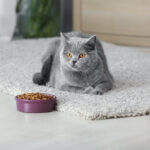It’s a common joke that cats are picky eaters, but when your feline friend genuinely refuses food, it’s no laughing matter. If your cat won’t eat, it’s a serious concern that warrants your immediate attention. While a loss of appetite is worrying for any pet, it poses a particularly significant risk to cats.
When cats don’t consume enough calories, their bodies start breaking down fat reserves for energy. This process, vital for survival, requires the liver to process fat, and this crucial step needs sufficient protein. In cats who suddenly stop eating and experience rapid weight loss, protein supplies are quickly depleted. This leads to a dangerous condition called hepatic lipidosis, where the liver becomes overwhelmed by fat, potentially leading to liver failure.
A diminished appetite is frequently a key indicator that your cat is unwell. Therefore, it’s crucial to seek veterinary advice as soon as you observe a change in your cat’s eating habits. Acting swiftly can significantly increase the chances of a positive outcome and help your cat get back to their healthy, eating habits.
Decoding Why Your Cat Won’t Eat
Underlying Illnesses: A primary reason for a cat’s refusal to eat is often an underlying health issue. Loss of appetite is a significant symptom that something is wrong internally. A range of conditions can trigger this, including infections, kidney disease, pancreatitis, gastrointestinal problems, and even cancer. Dental pain, such as a toothache, can also be a significant deterrent to eating. If you suspect kidney issues, you can learn more about kidney failure in cats to better understand this potential cause.
Adverse Reaction to Vaccination: Have you noticed your cat’s decreased appetite shortly after a routine vaccination appointment? If so, the reason your cat won’t eat might be a reaction to the vaccines. While vaccinations are essential for protecting cats from serious diseases, they can sometimes cause temporary side effects. Loss of appetite is among the more common, usually mild and short-lived, side effects. Understanding more about cat vaccinations can help you be prepared for potential reactions.
Stress from Travel and Unfamiliar Environments: Cats are creatures of habit, and disruptions to their routines can easily cause stress, leading to a loss of appetite. Travel, particularly by car or plane, can induce motion sickness in some cats, resulting in nausea and food refusal. New surroundings, even within the home, can be unsettling and impact their eating habits.
Finickiness and Psychological Factors: If your veterinarian rules out physical illness, psychological or behavioral issues could be the reason behind your cat’s lack of appetite. Anxiety or even depression in cats can significantly affect their eating habits. Changes in their daily routine, household dynamics (like new people or pets, or the loss of a pet), or even environmental factors can disturb sensitive cats. Of course, some cats are simply naturally finicky eaters. Remember that cats generally take time to adjust to new foods, so a recent dietary change could be the reason behind their reluctance to eat.
Other environmental stressors can also contribute to a cat’s refusal to eat. These include excessive noise, the presence of other animals in their feeding area, unclean food bowls, or the proximity of their food to their litter box.
It’s crucial to identify the cause of your cat’s refusal to eat to provide the appropriate care. Consulting with your veterinarian is the first and most important step in addressing this issue and ensuring your cat’s health and well-being.


